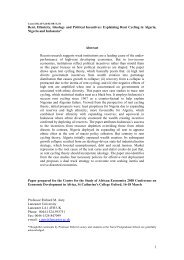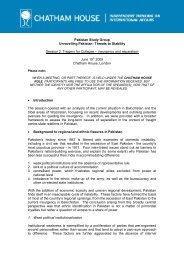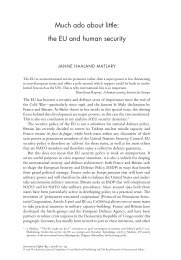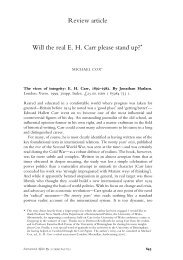The UK and European defence: leading or leaving? - Chatham House
The UK and European defence: leading or leaving? - Chatham House
The UK and European defence: leading or leaving? - Chatham House
You also want an ePaper? Increase the reach of your titles
YUMPU automatically turns print PDFs into web optimized ePapers that Google loves.
<strong>The</strong> <strong>UK</strong> <strong>and</strong> <strong>European</strong> <strong>defence</strong><br />
have run the campaign in a way that would have been politically acceptable to<br />
<strong>European</strong> public opinion, the Libyan opposition <strong>or</strong> the UN.<br />
If Libya thus demonstrated that there still is not enough Europe in <strong>European</strong><br />
security, either politically <strong>or</strong> militarily, it was also an indication that in the future<br />
there is likely to be less America in <strong>European</strong> security. As a decade of ‘war on<br />
terr<strong>or</strong>’ is wound up, the United States is shifting its strategic focus to the Asia–<br />
Pacific region. Consequently, as Americans have repeatedly made clear, 16 they now<br />
expect <strong>European</strong>s to take charge of crises in their neighbourhood on their own. In<br />
David Lidington’s w<strong>or</strong>ds, the United States is ‘looking to w<strong>or</strong>k in partnership with<br />
Europe, rather than providing security on behalf of Europe’. This strategic shift is<br />
partly dependent on Europe’s ability to defend itself. True burden-sharing would<br />
see <strong>European</strong>s acquiring their own enablers, allowing US capacity to be diverted<br />
elsewhere. <strong>The</strong>ref<strong>or</strong>e the prerequisite f<strong>or</strong> the American pivot is <strong>European</strong> strategic<br />
autonomy, at least regionally. If Europe were seriously threatened, the United<br />
States would have no choice but to intervene, because of its own vital interests. In<br />
that sense, it remains a <strong>European</strong> power. <strong>European</strong> capitals, all too well aware of<br />
this, ign<strong>or</strong>e at their peril the possibility that the US might decide to make the point<br />
by withholding its military supp<strong>or</strong>t f<strong>or</strong> a crisis management operation of imp<strong>or</strong>tance<br />
to <strong>European</strong>s that does not threaten vital US interests—such as that in Libya.<br />
<strong>The</strong> consequences of this shift f<strong>or</strong> <strong>European</strong> <strong>defence</strong> <strong>and</strong> the possibilities it opens<br />
up are fundamental, prompting seni<strong>or</strong> British military figures to state publicly<br />
that ‘President Obama has changed the game <strong>and</strong> in doing this has surely shone a<br />
light on Britain’s, <strong>and</strong> Europe’s, <strong>defence</strong> nakedness’. 17 First of all, <strong>European</strong>s will<br />
obviously have to invest in the capabilities required by the autonomy that is f<strong>or</strong>ced<br />
upon them. Today, no single <strong>European</strong> country is capable on its own of generating<br />
significant new capabilities, particularly not in strategic enablers. <strong>The</strong> only<br />
feasible solution in today’s budgetary situation, whether through the CSDP <strong>or</strong><br />
NATO, is a collective <strong>European</strong> one, which underlines the imp<strong>or</strong>tance of Pooling<br />
<strong>and</strong> Sharing/Smart Defence. But in <strong>or</strong>der to make collective capability decisions,<br />
<strong>European</strong>s need to define a level of ambition f<strong>or</strong> their autonomous role as security<br />
provider. <strong>The</strong> future capability mix (as well as intelligence <strong>and</strong> planning) ought to<br />
be determined by agreed pri<strong>or</strong>ities, both geographical <strong>and</strong> functional, f<strong>or</strong> the most<br />
likely deployments, under any flag, as a function of Europe’s common interests<br />
<strong>and</strong> its common f<strong>or</strong>eign policy, of which the military is but an instrument. In<br />
other w<strong>or</strong>ds, collective <strong>European</strong> capability decisions require collective <strong>European</strong><br />
strategy. While the United States might not fully appreciate <strong>or</strong> welcome it, the<br />
pivot all but obliges <strong>European</strong>s to f<strong>or</strong>m a caucus on <strong>defence</strong>.<br />
That caucus already exists: it is commonly known as the CSDP. A reappraisal of<br />
its potential in the light of the American pivot constitutes an excellent opp<strong>or</strong>tunity<br />
to reshape <strong>and</strong> thereby to reinvig<strong>or</strong>ate the transatlantic security architecture.<br />
16 In particular in Defense Secretary Robert Gates’s Brussels farewell speech, Reflections on the state <strong>and</strong> future of the<br />
transatlantic alliance, at the Security <strong>and</strong> Defence Agenda on 10 June 2011 <strong>and</strong> in US Department of Defense,<br />
Sustaining US global leadership: pri<strong>or</strong>ities f<strong>or</strong> 21st century defense (Washington DC: Department of Defense, Jan.<br />
2012).<br />
17 Michael Graydon, Jeremy Blackham, Andrew Lambert <strong>and</strong> Allen Sykes, ‘<strong>European</strong> <strong>and</strong> <strong>UK</strong> <strong>defence</strong> dangerously<br />
exposed’, Financial Times, 19 Jan. 2012, p. 8.<br />
International Affairs 88: 6, 2012<br />
Copyright © 2012 <strong>The</strong> Auth<strong>or</strong>(s). International Affairs © 2012 <strong>The</strong> Royal Institute of International Affairs.<br />
1309














